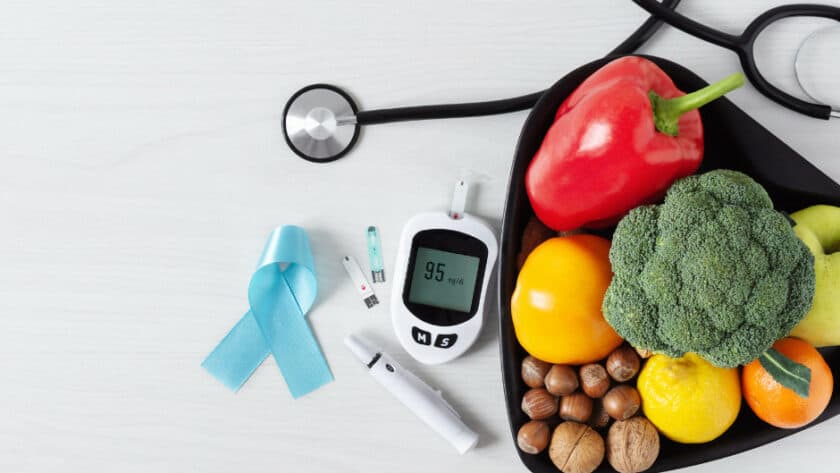If you or a loved one has been diagnosed with diabetes, you know firsthand how much diet plays a role in your overall health and well-being. Eating the right foods can help manage blood sugar levels and reduce the risk of complications. While a poor diet can cause blood sugars to spike and lead to further health problems. In this article, we’ll explore the ins and outs of designing a healthy and balanced diets for diabetics, while keeping in mind the many different types of this condition.
Understanding Diabetes
Diabetes is a chronic condition that affects how the body processes blood sugar, or glucose. There are different types of diabetes, each with their own causes and management strategies.
Type 1 Diabetes
This type of diabetes is an autoimmune disease that occurs when the body’s immune system attacks. And destroys the cells in the pancreas that produce insulin. Insulin is a hormone that helps the body use glucose for energy. Without insulin, glucose builds up in the bloodstream, leading to high blood sugar levels. This type of diabetes is often diagnosed in children and young adults, but it can occur at any age.
People with type 1 diabetes need to take insulin injections or use an insulin pump to manage their blood sugar levels. They also need to monitor their blood sugar levels regularly and make adjustments to their insulin doses as needed. Type 1 diabetes cannot be prevented, and there is currently no cure.
Type 2 Diabetes
The type 2 diabetes is the more common form of diabetes, accounting for about 90% of all cases. It occurs when the body’s cells become resistant to insulin. Or when the pancreas is unable to produce enough insulin to meet the body’s needs. This can lead to high blood sugar levels and a variety of health problems over time. Including heart disease, kidney disease, and nerve damage.
Type 2 diabetes is often associated with lifestyle factors, such as being overweight or obese, having a sedentary lifestyle, and eating a diet high in sugar and processed foods. However, genetics and other factors also play a role. Treatment for type 2 diabetes typically involves lifestyle changes, such as losing weight, exercising regularly, and eating a healthy diet. Some people may also need to take oral medications or insulin to manage their blood sugar levels.
It’s important to catch type 2 diabetes early, as untreated high blood sugar levels can cause damage to the body over time. Regular check-ups with a healthcare provider can help identify early signs of type 2 diabetes.
Prediabetes
Prediabetes is a condition where blood sugar levels are higher than normal but not high enough to be diagnosed as type 2 diabetes. It’s estimated that about one in three American adults has prediabetes, but many are unaware of it. Prediabetes is an important stage to catch. As it can often be reversed through lifestyle changes before full-blown diabetes sets in.
Lifestyle changes that can help prevent or delay the onset of type 2 diabetes include losing weight, eating a healthy diet, and getting regular exercise. Some people may also benefit from medications that help improve insulin sensitivity.
Regular check-ups with a healthcare provider can help identify prediabetes and provide guidance on how to prevent or manage it.
Importance of Diets for Diabetics
Diabetes is a chronic condition that affects millions of people worldwide. It is a disease where the body either does not produce enough insulin or cannot use the insulin it produces effectively. Insulin is a hormone that regulates blood sugar levels in the body. Without proper management, diabetes can lead to serious complications such as heart disease, nerve damage, kidney disease, and blindness. One of the most important aspects of diabetes management is a healthy diet. That’s why this article is crucial to identify the importance of diets for diabetics.
Blood Sugar Control
The primary goal of diet in diabetes management is to control blood sugar levels. This can be achieved through a healthy balance of carbohydrates, proteins, and fats. And by avoiding foods that can cause blood sugar spikes. Carbohydrates are the main source of energy for the body. But they can also cause blood sugar levels to rise quickly. It is important to choose carbohydrates that are high in fiber, such as whole grains, fruits, and vegetables. As they are digested more slowly and do not cause spikes in blood sugar levels.
Protein is important for building and repairing tissues in the body. It does not have a significant effect on blood sugar levels, but it is important to choose lean sources of protein, such as chicken, fish, and legumes, to avoid consuming excess fat and calories.
Fats are also an important part of a healthy diet, but it is important to choose healthy fats such as olive oil, nuts, and avocado. Saturated and trans fats should be avoided as they can increase the risk of heart disease.
Weight Management
Another important aspect of diabetes management is maintaining a healthy weight. Being overweight can increase the risk of developing type 2 diabetes. And even modest weight loss can help manage blood sugar levels and reduce the risk of complications. In addition to a healthy diet, regular physical activity is also important for weight management. Exercise can help burn calories and improve insulin sensitivity, which can help control blood sugar levels.
Reducing Complications
A healthy and balanced diet can also help reduce the risk of complications from diabetes. These complications can include heart disease, nerve damage, kidney disease, and blindness, among others. For example, consuming a diet high in fruits and vegetables can help reduce the risk of heart disease and stroke, while limiting sodium intake can help reduce the risk of kidney disease.
In addition to a healthy diet, it is important for people with diabetes to monitor their blood sugar levels regularly, take their medications as prescribed, and work with their healthcare team to develop a comprehensive diabetes management plan.
Carbohydrates and Diabetes
Carbohydrates are one of the three macronutrients that make up our diet, along with protein and fat. They provide our bodies with energy, but they can also have a significant impact on blood sugar levels, which is especially important for diabetics to keep in mind.
Types of Carbohydrates
There are two types of carbohydrates: simple and complex. Simple carbohydrates are made up of one or two sugar molecules and are found in foods like candy, soda, and other sugary treats. They are digested quickly and can cause a rapid spike in blood sugar levels. Complex carbohydrates, on the other hand, are made up of many sugar molecules and are found in foods like whole grain breads and cereals, fruits, and vegetables. They are digested more slowly and cause less of a blood sugar spike.
When choosing carbohydrates, it’s important for diabetics to focus on complex carbohydrates. This is crucial in diets for diabetics. These can help to provide sustained energy and keep blood sugar levels stable.
Carb Counting
Counting carbohydrates can be a helpful tool for managing blood sugar levels. This involves keeping track of how many carbohydrates you eat at each meal and taking insulin doses accordingly. It can take some practice to get the hang of, but many diabetics find it to be an effective way to manage their condition.
It’s important to note that not all carbohydrates are created equal. For example, a slice of white bread and a slice of whole wheat bread may have the same number of carbohydrates, but the whole wheat bread is a better choice because it is a complex carbohydrate that will be digested more slowly.
Glycemic Index
The glycemic index is another tool that can be used to help manage diabetes. This measures how quickly different foods cause blood sugar to rise, and can help guide food choices. Foods with a high glycemic index, such as white bread and sugary drinks, can cause a rapid spike in blood sugar levels. Foods with a low glycemic index, such as whole grain breads, fruits, and vegetables, are digested more slowly and cause a more gradual rise in blood sugar levels.
By incorporating complex carbohydrates, counting carbohydrates, and paying attention to the glycemic index, diabetics can better manage their blood sugar levels and improve their overall health.
Protein and Diabetes
Diabetes is a chronic condition that affects millions of people worldwide. It is a metabolic disorder characterized by high blood sugar levels, which can lead to a range of health complications if left unmanaged. One way to manage diabetes is through diet, and protein plays a crucial role in this process.
Protein Sources
Protein is an essential nutrient for diabetics, as it can help regulate blood sugar levels and promote weight loss. Good sources of protein include lean meats, fish, beans, and low-fat dairy products. Lean meats like chicken and turkey are excellent sources of protein that are low in saturated fat and calories. Fish, especially fatty fish like salmon and tuna, are rich in omega-3 fatty acids. Which have been shown to reduce inflammation and lower the risk of heart disease. Beans and lentils are excellent sources of plant-based protein that are also high in fiber, which can help regulate blood sugar levels. Low-fat dairy products like milk, yogurt, and cheese are also good sources of protein that can help maintain bone health.
Protein Recommendations
Individual protein needs can vary depending on factors like age, activity level, and overall health. However, diabetics should aim to get at least 10-20% of their daily calories from protein. For example, if you consume 2000 calories per day, you should aim to get 50 grams to 100 grams of protein per day. This can be achieved by incorporating protein-rich foods into each meal and snack.
Balancing Protein Intake
It’s also important to balance protein intake with carbohydrates and fats, as excess protein can be converted into glucose and cause blood sugar spikes. A registered dietitian can help you design a meal plan that meets your individual needs. They can also help you determine the right balance of macronutrients – protein, carbohydrates, and fats – to help you maintain stable blood sugar levels. For example, a meal that contains protein, whole grains, and vegetables can help slow down the absorption of glucose into the bloodstream and prevent blood sugar spikes.
In conclusion, managing diets for diabetics can be a challenging but rewarding journey. By focusing on healthy, whole foods and tracking carbohydrate and protein intake, diabetics can help control their blood sugar levels, maintain a healthy weight, and reduce the risk of complications. If you or a loved one has been diagnosed with diabetes, don’t hesitate to seek the guidance of a healthcare professional or registered dietitian to help you design a meal plan that works for you. With the right diet and lifestyle changes, it is possible to live a happy and healthy life with diabetes.
Related Articles: The Best Diets for IBS: What to Eat and Avoid





